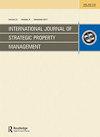Interactive Marketing Practices and Market Performance in Soft Drinks Industry: An Empirical Study on Competitive Advantage As a Mediator
IF 1.7
4区 管理学
Q3 MANAGEMENT
引用次数: 0
Abstract
Purpose: To what extent does competitive advantage mediate the relationship between interactive marketing practices and market performance? In attempt to respond to this question, this study was conducted with the aim of examining the mediating role of competitive advantage on the interactive marketing practices market performance relationship in the soft drink industry context. Methodology: A cross-sectional research design was taken on a sample of 322 soft drink manufacturing enterprises in the city of Kigali. The unit of inquiry for the quantitative study were the sales, accounting, finance, marketing and communication managers whereas chief executive officers were the unit of inquiry for the qualitative study. The study used both questionnaire and interview guide to collect data. Path analysis, MedGraph v3.xlsm and Hierarchical regression were used to test the model. Findings: Study findings show that performance of soft drink enterprises is positively associated with interactive marketing practices. It was observed in this study also that competitive advantage partially mediates this relationship. Practically the four conditions for mediation were met as suggested by Baron and Kenny, (1986). Firstly, we observe that there was a significant direct effect of Interactive marketing practices on market performance (=.270; p<.05). Secondly, Interactive marketing practices and competitive advantage have a significant relationship (=.400; p<.05), and thirdly, the observed coefficient of the mediator (competitive advantage) is significant as seen in the regression model 3 (=.396; p<.05). It is observed, finally, that the absolute effect of Interactive marketing practices on market performance is smaller in regression model 3 (=.157; p<.05) than in regression model 2 (=.270; p<.05).This confirm the mediation effects of competitive advantage. Further still a ratio index of 41.9% was observed an indication that competitive advantage reduces the relationship between interactive marketing practices and performance by 41.9% in Kigali city soft drink enterprises. Recommendations: In line with this confirmed mediation effects, managers are reminded to allocate sufficient resources to customer intimacy, product leadership and operational excellence as specific competitive priorities if they are to attain better market performance results. The study is of a theoretical importance as it empirically confirm the mediating role of competitive advantage in the interactive marketing practices-market performance relationship in a soft drink industry context. The imperative for practitioners to sufficiently attend to operational efficiency, customer intimacy and product leadership is reiterated on in this study.软饮料行业互动营销实践与市场绩效:竞争优势作为中介的实证研究
目的:竞争优势在多大程度上调解了互动营销实践与市场绩效之间的关系?为了回答这个问题,本研究以软饮料行业为背景,考察竞争优势对互动营销实践市场绩效关系的中介作用。方法:采用横断面研究设计,对基加利市322家软饮料生产企业进行了抽样调查。定量研究的调查单位是销售、会计、财务、营销和沟通经理,而定性研究的调查单位是首席执行官。本研究采用问卷调查法和访谈法收集数据。路径分析,MedGraph v3。采用xlsm和层次回归对模型进行检验。研究发现:研究发现,软饮料企业绩效与互动营销实践呈正相关。本研究还发现,竞争优势在这一关系中起到部分中介作用。实际上,根据Baron和Kenny(1986)的建议,调解的四个条件都得到了满足。首先,我们观察到互动营销实践对市场绩效有显著的直接影响(= 0.270;p < . 05)。第二,互动营销实践与竞争优势存在显著关系(= 0.400;P < 0.05),第三,中介(竞争优势)的观察系数在回归模型3中显着(=.396;p < . 05)。最后,我们观察到,在回归模型3中,互动营销实践对市场绩效的绝对影响较小(=.157;P < 0.05)比回归模型2 (= 0.270;p < . 05)。这证实了竞争优势的中介作用。此外,还观察到41.9%的比率指数,表明竞争优势使基加利市软饮料企业的互动营销实践与绩效之间的关系降低了41.9%。建议:根据这一已证实的中介效应,我们提醒管理者,如果他们想要获得更好的市场绩效结果,就应该将足够的资源分配给客户亲密度、产品领导和卓越运营,作为具体的竞争优先事项。本研究实证地证实了竞争优势在软饮料行业互动营销实践-市场绩效关系中的中介作用,具有重要的理论意义。在本研究中,从业者必须充分关注运营效率、客户亲密度和产品领导力。
本文章由计算机程序翻译,如有差异,请以英文原文为准。
求助全文
约1分钟内获得全文
求助全文
来源期刊
CiteScore
4.00
自引率
18.50%
发文量
23
审稿时长
15 weeks
期刊介绍:
International Journal of Strategic Property Management is a peer-reviewed, interdisciplinary journal which publishes original research papers. The journal provides a forum for discussion and debate relating to all areas of strategic property management. Topics include, but are not limited to, the following: asset management, facilities management, property policy, budgeting and financial controls, enhancing residential property value, marketing and leasing, risk management, real estate valuation and investment, innovations in residential management, housing finance, sustainability and housing development, applications, etc.

 求助内容:
求助内容: 应助结果提醒方式:
应助结果提醒方式:


